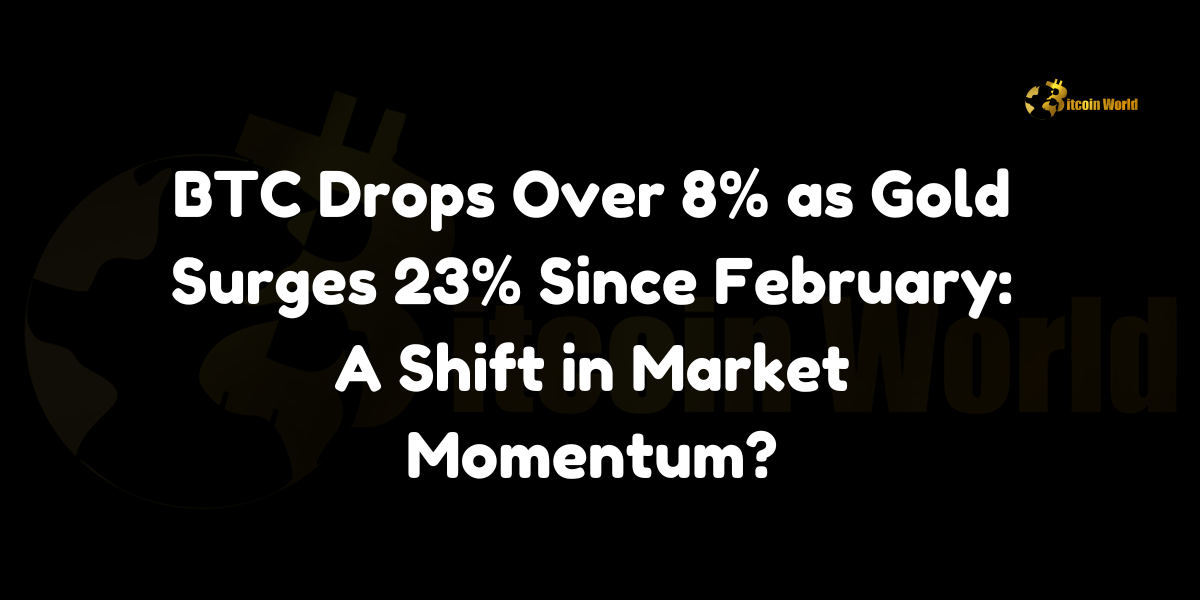BTC Drops gold rises February 2024 trends have caught the attention of market observers, particularly those who have long been skeptical of cryptocurrencies. Prominent gold advocate and Bitcoin skeptic, Peter Schiff, recently highlighted on X (formerly Twitter) that Bitcoin has underperformed significantly since late February, despite the much-anticipated launch of U.S. spot Bitcoin ETFs. Meanwhile, gold has experienced a robust 23% increase over the same period, prompting discussions about a potential shift in market momentum.
The Underperformance of Bitcoin
Since late February, Bitcoin has seen a notable decline, with its price dipping over 8%. This performance has been particularly surprising to many in the crypto community, as the period was marked by the introduction of U.S. spot Bitcoin ETFs—an event that many expected would bolster Bitcoin’s price through increased institutional interest and accessibility.
However, the anticipated boost from these ETFs has not materialized as expected. Instead, Bitcoin’s price has trended downward, raising questions about the current state of the cryptocurrency market. Several factors could be contributing to Bitcoin’s recent struggles:
Market Sentiment: Despite the launch of spot Bitcoin ETFs, overall market sentiment may have turned bearish due to broader economic concerns, regulatory uncertainties, or profit-taking by investors after a strong rally earlier in the year.
Regulatory Pressures: Ongoing regulatory scrutiny of cryptocurrencies in major markets, including the U.S., could be weighing on Bitcoin’s price. Uncertainty about future regulations, particularly in relation to digital assets, may have dampened investor enthusiasm.
Technical Corrections: Bitcoin has experienced several significant rallies and corrections over the past year. The current dip may be part of a larger market correction, where prices retreat after reaching overextended levels.
Gold’s Resurgence
In stark contrast to Bitcoin’s decline, gold has enjoyed a strong rally, with its price rising by 23% since late February. This surge in gold’s value is particularly notable as it coincides with a period of heightened economic uncertainty, including concerns over inflation, geopolitical tensions, and fluctuations in global financial markets.
Gold has traditionally been viewed as a safe-haven asset, attracting investors during times of economic instability. Its recent rise suggests that more investors are seeking the stability and reliability of gold as a hedge against potential risks in the broader economy. Several factors could be driving this renewed interest in gold:
Inflation Concerns: As inflationary pressures continue to mount globally, gold’s appeal as a store of value has increased. Investors may be turning to gold to protect their wealth from the eroding effects of inflation.
Geopolitical Tensions: Ongoing geopolitical uncertainties, including conflicts and trade tensions, have historically driven investors toward gold. The current global landscape, with multiple areas of conflict and economic rivalry, has likely contributed to gold’s rise.
Market Volatility: As financial markets experience increased volatility, the demand for stable assets like gold has grown. This flight to safety is a common reaction during periods of market instability, and it appears to be playing out once again.
Peter Schiff’s Analysis: A Shift in Momentum?
Peter Schiff, a well-known advocate for gold and a vocal critic of Bitcoin, has emphasized the significance of the recent market movements. He points out that the momentum appears to have shifted in favor of gold, with Bitcoin struggling to maintain its value despite favorable developments like the ETF launches.
Schiff’s observations resonate with the broader narrative that gold, as a time-tested store of value, may be regaining its position as the preferred choice for risk-averse investors. His analysis suggests that the current market environment, characterized by uncertainty and volatility, is more conducive to traditional assets like gold rather than speculative ones like Bitcoin.
Implications for Investors
The contrasting performance of Bitcoin dips gold rises February 2024 raises important considerations for investors:
Portfolio Diversification: The recent trends highlight the importance of diversification. While Bitcoin and other cryptocurrencies can offer high returns, they also come with significant volatility. Gold, on the other hand, provides stability, making it a valuable component of a balanced portfolio, especially in uncertain times.
Market Sentiment Monitoring: Investors should closely monitor market sentiment and external factors, such as regulatory developments and macroeconomic trends, as these can significantly impact asset performance. The current environment suggests a cautious approach may be warranted, particularly for those heavily invested in cryptocurrencies.
Long-Term vs. Short-Term Strategies: The divergence between Bitcoin and gold’s performance underscores the need for clear investment strategies. Those with a long-term perspective on Bitcoin may view the current dip as a buying opportunity, while those focused on short-term gains might consider reallocating some assets to gold or other stable investments.
Conclusion
The Bitcoin dips gold rises February 2024 scenario underscores a potential shift in market momentum, as highlighted by Peter Schiff. With Bitcoin down over 8% and gold up 23% since late February, the market seems to be favoring the stability of traditional assets over the volatility of cryptocurrencies.
As investors navigate this complex landscape, the contrasting performances of Bitcoin and gold serve as a reminder of the importance of diversification, risk management, and staying informed about market dynamics. Whether this trend will continue or reverse in the coming months remains to be seen, but for now, gold appears to be shining brighter than Bitcoin.
To learn more about the innovative startups shaping the future of the crypto industry, explore our article on latest news, where we delve into the most promising ventures and their potential to disrupt traditional industries.





